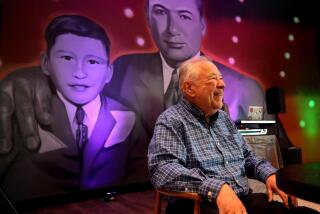Gary Essert; Founder of Filmex and Cinematheque
- Share via
Gary Essert, founder of the Los Angeles International Film Exposition, which became an internationally renowned showcase of new and experimental motion pictures until it foundered in a bitter economic quagmire, died Wednesday at his Los Angeles home of the complications of AIDS.
Essert, who was 54, also founded and became artistic director and chief executive officer of American Cinematheque. He died only six weeks after his colleague and longtime companion Gary Abrahams, who also died of AIDS complications.
Called “a great visionary” by Sydney Pollack, the actor, producer and director who now chairs American Cinematheque, Essert had been an important figure on the national film scene since his student days in the 1960s at UCLA, where he helped design the screening facilities.
He determined as a student that although Los Angeles was considered the birthplace of film, it also was one of the few major cities in the world without its own festival.
In 1971 he created Filmex at a single theater in Hollywood and presided over its growth into a seminal institution of non-commercial motion pictures, which drew critics, stars and filmmakers from around the world.
In its heyday, three and sometimes more theaters in the city presented simultaneous screenings over a two-week period. With hundreds of pictures playing to audiences of more than 100,000, it was considered the largest festival of its kind in the world.
Unlike other festivals, which surrender content to directors, Essert maintained control over screenings through a series of selection committees. Screenings proved an eclectic mix of esoteric foreign films, movie marathons, discussions with filmmakers, experimental short subjects and children’s pictures.
But in 1983 Essert was ousted as artistic director and charged with being responsible for Filmex’s perennial insolvency. He particularly was accused by the board of trustees of failing to hold that year’s exposition within budgetary guidelines even though he had been granted additional funding. In an acrimonious debate that spread over several days in August, 1983, several Filmex staffers left with Essert. At the time, the festival had grown from a $150,000 to a $700,000 budget.
Filmex eventually went under and Essert founded American Cinematheque, a sister organization to the Cinematheque Francaise and the British Film Institute, which currently is seeking a permanent home in Hollywood.
Originally, Essert wanted to restore Pan Pacific Auditorium as the site of his new film festival, but the developer lost his financing. Other theaters and buildings have been suggested in the interim. A spokeswoman for Cinematheque said Wednesday that Essert had been assured shortly before his death that a site selection was imminent.
Essert throughout his career had grand plans for films.
In 1990 and again last year he staged giant-screen presentations of such classic musicals as “Singin’ in the Rain” and “The King and I,” both at the Hollywood Bowl. He also conceived the Moving Picture Ball, an ongoing show of support for the industry.
Although the only films the native of Oakland ever helped produce were student films, his flair for promotion at UCLA became legendary.
“Gary brought big-time show business to student films by treating their exhibition like Hollywood premieres,” said longtime colleague Ralph Sargent.
He instituted 24-hour marathon screenings at the Westwood campus and encouraged greater experimentation among the student filmmakers. He also was able, through his studio contacts, to bring major films to the school. Even though he was only a fledgling movie maker he counted among his friends such major directors as George Cukor and King Vidor. Cukor in particular was credited with helping establish Filmex.
Essert’s single-minded devotion to quality and daring on the screen brought on the financial extravagances that killed Filmex, said those who knew him best.
In 1981, during Los Angeles’ bicentennial, Essert was named one of the “200 Men and Women of Achievement” in the city.
He is survived by his mother, Jeanne Williams, who requests donations in his memory be made to American Cinematheque, 1717 N. Highland Ave., Los Angeles 90028.
A funeral service will be held Saturday at 10:30 a.m. at the Old North Church, Forest Lawn Hollywood Hills.
More to Read
The biggest entertainment stories
Get our big stories about Hollywood, film, television, music, arts, culture and more right in your inbox as soon as they publish.
You may occasionally receive promotional content from the Los Angeles Times.










